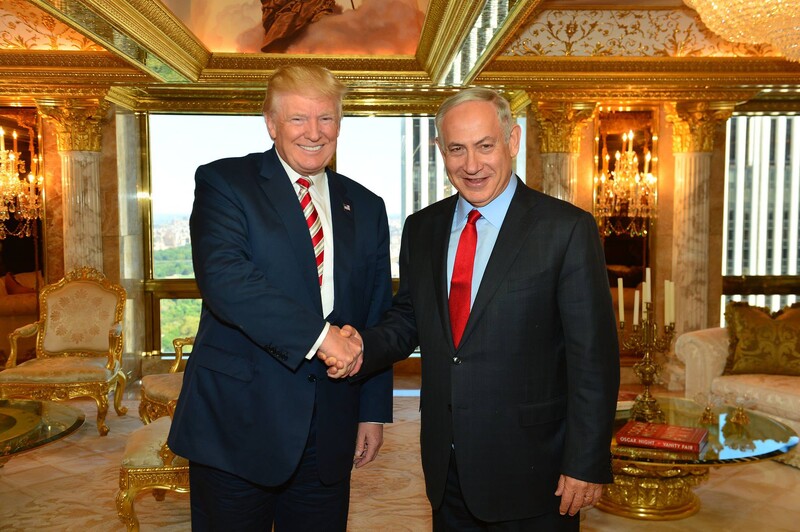Will Trump help Israel annex the West Bank?
 Tuesday, November 15, 2016 at 08:21PM
Tuesday, November 15, 2016 at 08:21PM https://electronicintifada.net/blogs/ali-abunimah/will-trump-help-israel-annex-west-bank?
by Ali Abunimah 14 November 2016 The Electronic Intifada

The election of Donald Trump is golden opportunity for Israel and its lobby to push their agenda to annex Palestinian land. (via Facebook)
The powerful Israel lobby group AIPAC has apparently dropped its formal commitment to a two-state solution.
In this tweet, activist Daniel Sieradski points out the changes in the language on AIPAC’s website:
Previously, the lobby group’s page on the “peace process” asserted that AIPAC “strongly supports a two-state solution and works tirelessly to bring peace to the region.”
Now, there is no mention of a two-state solution. Instead AIPAC says simply that “a solution cannot be imposed on the parties.”
It is unclear when exactly the change was made, but the Internet Archive confirms it is relatively new. The most recent snapshot of the AIPAC site shows that language supporting the two-state solution was still there as of July.
As recently as October, the State Department declared that Israel’s ongoing construction of settlements in the occupied West Bank was “cementing a one-state reality of perpetual occupation.”
The Obama administration can claim a considerable share of the responsibility for that. Not only has it failed to use US aid to Israel as leverage, but as its final kick in the teeth to the Palestinians and prospects for a just peace, Obama unconditionally boosted US military support for Israel to record levels – at least $38 billion over the next decade.
Annexation?
AIPAC may simply be moving to seize the opportunity of the election of Donald Trump to reveal Israel’s real agenda: permanent annexation of the occupied West Bank.
Israeli Prime Minister Benjamin Netanyahu nominally supports a two-state solution, while arguing that it is not possible for the forseeable future and imposing conditions to ensure it can never happen.
His cabinet colleagues are less coy. Justice minister Ayelet Shaked, for instance,recently called for reviving the so-called “Jordanian option.”
In her version of the plan advocated by late Israeli President Shimon Peres in the 1980s, Israel would annex Area C – the 60 percent of the West Bank fully controlled by Israel under the terms of the 1993 Oslo accords. Palestinians would then receive some form of limited autonomy under Jordanian tutelage in tiny urban enclaves where their population is concentrated.
AIPAC may have judged that the moment to roll out its real agenda is opportune, with the Republican Party taking control of the White House as well as both houses of Congress.
Indeed the new AIPAC stance closely reflects the Republican Party’s official platform released in July in the midst of the election campaign.
“We reject the false notion that Israel is an occupier,” the platform states. “The United States seeks to assist in the establishment of comprehensive and lasting peace in the Middle East, to be negotiated among those living in the region.”
“We oppose any measures intended to impose an agreement or to dictate borders or other terms,” the platform adds.
It vows to support legislation against the Palestinian-led boycott, divestment and sanctions movement (BDS). And in what is presumably a reference to the UN, the platform calls for the US to cut off funding to any entity that seeks to “impose” terms on Israel.
Even though President-elect Trump’s personal positions on the Palestinian-Israeli issue have been contradictory, the Republican Party machine that is about to take the commanding heights of the government is unambiguously aligned with the most extreme factions in Israel.
AIPAC “apopleptic”
The morning after his upset victory, AIPAC quickly congratulated Trump in a press release that emphasizes the most pro-Israel talking points that the president-elect made in a speech to AIPAC as a candidate in March.
But AIPAC is reportedly “apopleptic” at one of Trump’s first key appointments, that of Steve Bannon as chief strategist.
Bannon is the former CEO of the far-right media outlet Breitbart News.
While Breitbart News’ coverage and commentary is strongly pro-Israel, Israel lobby groups accuse Bannon of fostering anti-Jewish prejudice.
Jonathan Greenblatt, director of the Anti-Defamation League (ADL), hascondemned the Bannon appointment. “It is a sad day when a man who presided over the premier website of the ‘alt-right’ – a loose-knit group of white nationalists and unabashed anti-Semites and racists – is slated to be a senior staff member in the ‘people’s house.”
If major American anti-Palestinian groups feel Bannon’s appointment puts them in an awkward position, it is one of their own making. The ADL and AIPAC may be uncomfortable with Trump’s open embrace of bigotry, but they have long been unabashed promoters of the bigotry and extremism of Netanyahu and his government who will likely have no trouble dealing with Trump and his White House.
Abraham Foxman, who held the post of ADL director for decades until his retirement last year, even embraced prominent Islamophobes with a history of anti-Semitism, such as evangelical pastor John Hagee, just as long as they were pro-Israel.
Trump’s election has received an enthusiastic response from Israeli leaders who hope the incoming president will move the US embassy to Jerusalem and help them bury the two-state solution once and for all.
*****************************************************************
 APJP |
APJP |  Post a Comment |
Post a Comment |